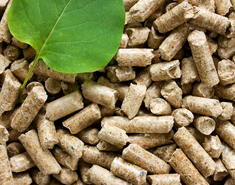SaraRasa pioneers pellet production in Indonesia
Finnfund has invested in a production plant in Indonesia, where SaraRasa Bioindo Pte. Ltd makes pellets from  agricultural residues. The operation has major environmental impacts. One of the company’s shareholders is Dovre Group, listed on the Helsinki Stock Exchange.
agricultural residues. The operation has major environmental impacts. One of the company’s shareholders is Dovre Group, listed on the Helsinki Stock Exchange.
Consumption of pellets produced from biomass is on the rise throughout the world. Used for generating heat and electricity, most pellets are consumed in Europe but Asian markets are now taking off.
Many Asian countries, like Japan, Korea and Taiwan, have passed laws encouraging power companies to use increasing amounts of renewable fuel. One of the least expensive renewables is biomass.
Pellets from biomass
SaraRasa is Indonesia’s first commercial-scale pellet producer. The company’s plant is located in Riau province, on the island of Sumatra.
To make the pellets, it uses agricultural biowaste, of which Indonesia produces an estimated 100 million tonnes a year. At present almost all of the residues from sugar cane, cassava and rice processing are discarded or disposed of by burning.
The technology needed to produce the pellets has been imported from Europe but SaraRasa has developed its own pre-processing system. In its plant, pulverised and dried biomass is compressed into a pellet a couple of centimetres long.
New production plants and jobs for a poor region
In addition to the positive environmental effects, SaraRasa is creating jobs in a poor rural area. The pellet plant directly employs about 100 local people and indirectly several hundred more. It is one of the main industrial employers in the area.
Indonesia is not an easy business environment for a start-up. It takes time and effort to obtain permits for example establishing a company and importing technology.
As the country’s first pellet manufacturer, SaraRasa has a great opportunity to create a viable new business sector in Indonesia.
The company aims to build more pellet production plants in the years ahead.
SaraRasa believes that Finnfund’s role is especially important in a country like Indonesia, where a wealthy, government-backed partner commands respect. Finnfund’s grasp of sustainable development issues brings extra value to the project.
Finnpartnership has granted Business Partnership Support for the project.

